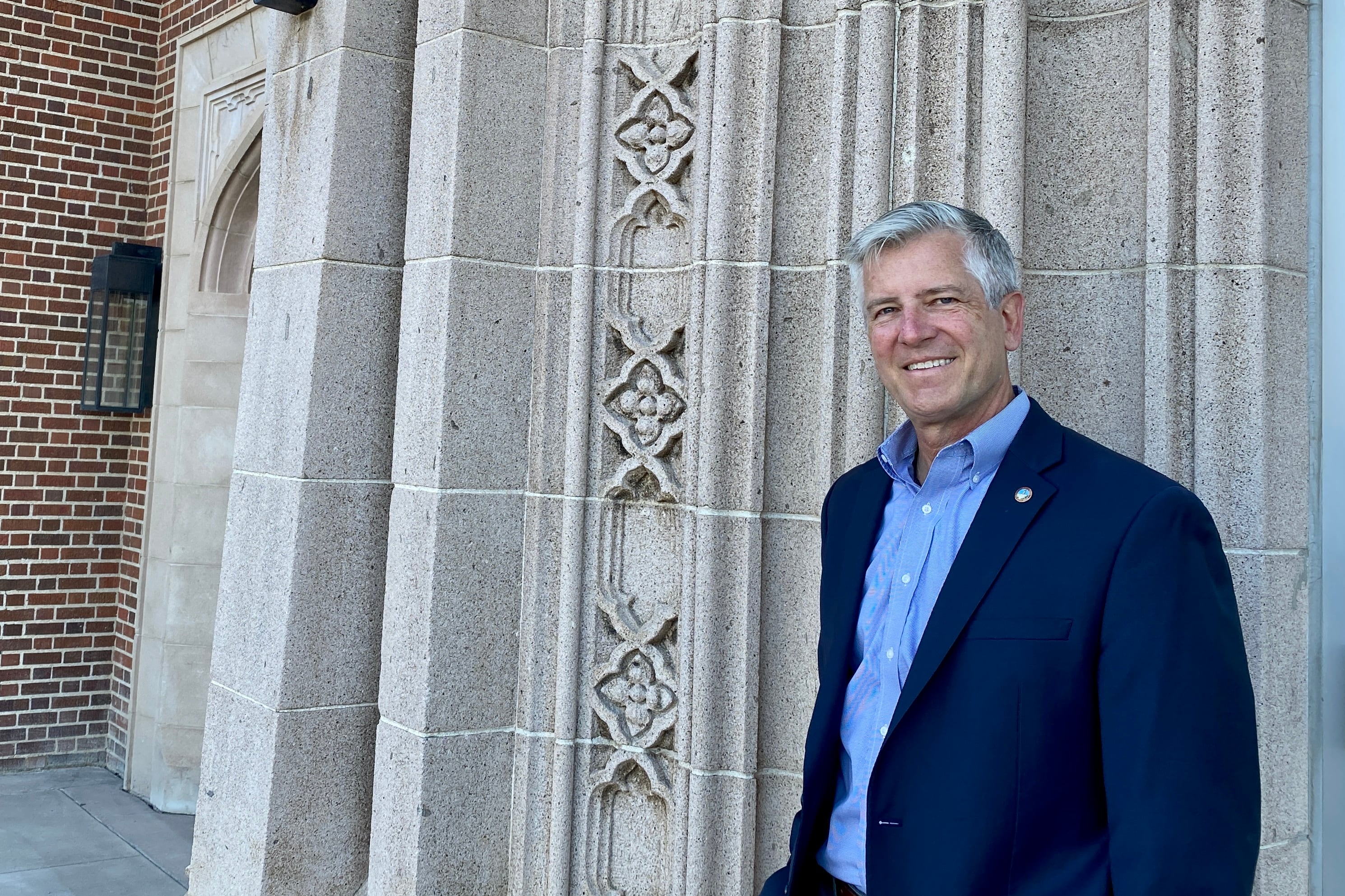John Youngquist, a longtime Denver educator who spent about a decade as principal of East High School, announced Wednesday that he’s running for a seat on the Denver school board.
Youngquist said he will run for an at-large seat representing the entire city. Although he lives in southeast Denver, where a school board seat is also up for election, Youngquist said the work of the at-large seat better reflects his decades-long experience in Denver Public Schools — as a student, a teacher, a principal, a district administrator, and a parent.
“My experience has been across the city over time,” he said, adding that he’s running at large “because it’s every student and every school that really does matter to me in my heart.”
Youngquist, 57, will have two opponents: Kwame Spearman, a former mayoral candidate and part-owner of the Tattered Cover bookstore, and Brittni Johnson, a DPS parent and doctoral student. Another candidate, Paul Ballenger, dropped out of the race in late September.
The seat is currently held by Auon’tai Anderson, who is running for a state House of Representatives seat instead of seeking re-election to the board.
Three of the seven Denver school board seats are up for grabs Nov. 7. The election has the potential to change the dynamics of the board, which has been criticized for infighting. Also at stake is how the board will deal with declining enrollment and respond to safety concerns, especially after a high-profile shooting inside East High in March.
Youngquist’s two teenage daughters are students at East, where he served two stints as principal, from 2007 to 2012 and 2017 to 2022. He returned to East in 2017 after the previous principal mishandled complaints against the cheerleading coach.
Youngquist said student safety has always been his top concern. When he was principal of Newlon Elementary in southwest Denver in the 1990s, he recalled having to develop his own protocol to deal with the drive-by shootings that were prevalent at the time: sounding an air horn so students on the playground knew to get down.
East had a school resource officer during Youngquist’s tenure — and he said he was among the principals in 2020 who signed a letter asking the school board not to remove police officers from schools. He said he agrees with the board’s recent decision to reinstate them.
But SROs are only one aspect of school safety, Youngquist said.
“My belief is that safety is grounded in the daily operation of the school, in the culture of the school,” he said. “And then you create structures to ensure your responses to behavioral challenges at the school site are responsive and supportive of young people.”
Youngquist was himself a DPS student, graduating from Thomas Jefferson High. He started his career there as a social studies teacher. He’s been principal of three DPS schools: East, Newlon, and the now-closed Smedley Elementary in northwest Denver.
He’s also worked as a principal supervisor and as a central office administrator developing programs to recruit more principals of color and help all principals stay in their jobs longer.
Youngquist also worked in the Cherry Creek School District and in Aurora Public Schools, where he was chief academic officer. He said he’s spent the past year as a consultant for districts including Denver and Aurora, as a principal coach, and as part-time chief operating officer for the Denver Youth Program, a nonprofit that aims to reduce youth violence.
If elected, Youngquist said he’d focus on pulling the board together to craft a clear vision for the district, recruiting and retaining diverse teachers and principals, and ensuring students are academically successful. To do that, Youngquist said he wouldn’t try to write policy as a board member, but rather would set goals and limitations so the experts — the superintendent and his staff — could recommend policy for the school board to consider.
“Every element of work we put into play in a district and in a school has to have the intention of creating successful teaching and learning experiences,” he said.
The board also has to make tough decisions. One recent example was the decision to close three schools with low enrollment, which the board voted on one day after the superintendent publicly recommended it.
Instead of reacting when a school’s enrollment is already too low, Youngquist said the district should develop a plan “for how and when we might engage in school closure conversations” so that parents better understand the process.
“That is an 18-month conversation that moves toward a decision,” Youngquist said. “That is not an 18-day or week-(long) conversation that moves toward closure.”
Although Denver school board candidates historically fall into one of two political groups — those backed by the teachers union and those backed by education reform organizations — Youngquist said he doesn’t see himself as an exclusive member of either camp.
Youngquist said he’s running because DPS is “in a lull.”
“I know the real work that it takes to fully engage a community in the success of a school … and the success of a district,” he said. “I’m fully optimistic that we can pull in that direction again and gain momentum so that over the course of the next several years, we’re seeing the experience turn into a fully positive one and seeing results that matter for kids in their school lives.”
Editor’s note: This story was updated after the ballot was finalized with the names of all candidates running for the at-large seat. It was also updated to reflect that former candidate Paul Ballenger dropped out of the race in late September.
Melanie Asmar is a senior reporter for Chalkbeat Colorado, covering Denver Public Schools. Contact Melanie at masmar@chalkbeat.org.






